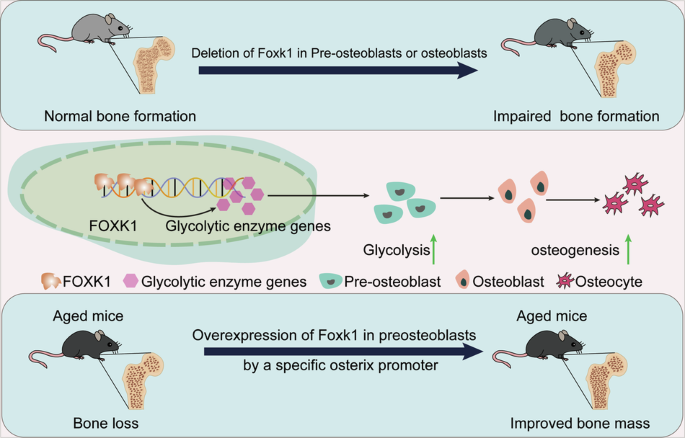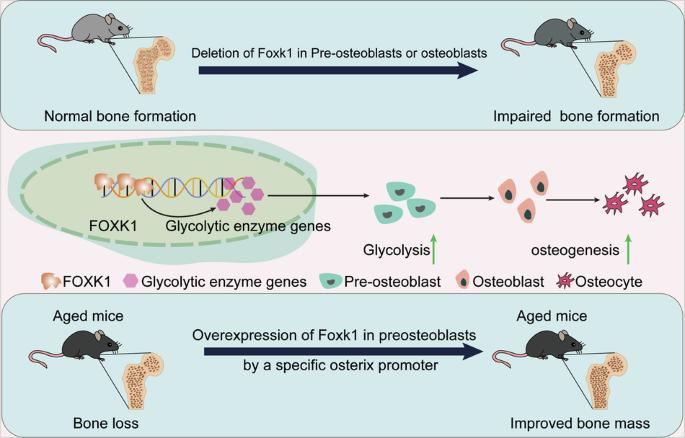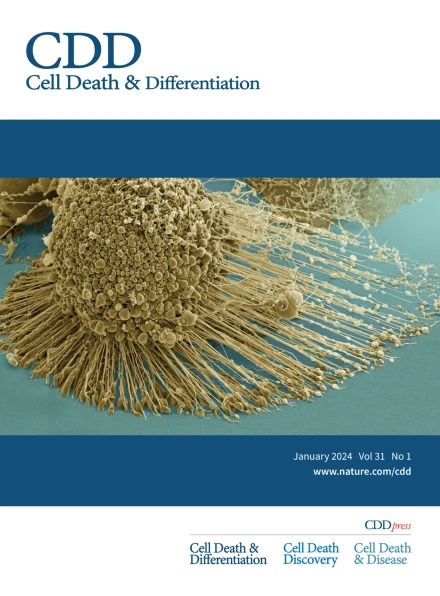Foxk1 promotes bone formation through inducing aerobic glycolysis
IF 13.7
1区 生物学
Q1 BIOCHEMISTRY & MOLECULAR BIOLOGY
引用次数: 0
Abstract
Transcription factor Foxk1 can regulate cell proliferation, differentiation, metabolism, and promote skeletal muscle regeneration and cardiogenesis. However, the roles of Foxk1 in bone formation is unknown. Here, we found that Foxk1 expression decreased in the bone tissue of aged mice and osteoporosis patients. Knockdown of Foxk1 in primary murine calvarial osteoblasts suppressed osteoblast differentiation and proliferation. Conditional knockout of Foxk1 in preosteoblasts and mature osteoblasts in mice exhibited decreased bone mass and mechanical strength due to reduced bone formation. Mechanistically, we identified Foxk1 targeted the promoter region of many genes of glycolytic enzyme by CUT&Tag analysis. Lacking of Foxk1 in primary murine calvarial osteoblasts resulted in reducing aerobic glycolysis. Inhibition of glycolysis by 2DG hindered osteoblast differentiation and proliferation induced by Foxk1 overexpression. Finally, specific overexpression of Foxk1 in preosteoblasts, driven by a preosteoblast specific osterix promoter, increased bone mass and bone mechanical strength of aged mice, which could be suppressed by inhibiting glycolysis. In summary, these findings reveal that Foxk1 plays a vital role in the osteoblast metabolism regulation and bone formation stimulation, offering a promising approach for preventing age-related bone loss.


Foxk1 通过诱导有氧糖酵解促进骨形成。
转录因子 Foxk1 可调节细胞增殖、分化和新陈代谢,促进骨骼肌再生和心脏生成。然而,Foxk1在骨形成中的作用尚不清楚。在这里,我们发现 Foxk1 在老龄小鼠和骨质疏松症患者的骨组织中表达减少。在原代小鼠犊骨成骨细胞中敲除 Foxk1 会抑制成骨细胞的分化和增殖。在小鼠前成骨细胞和成熟成骨细胞中条件性敲除 Foxk1 后,由于骨形成减少,骨量和机械强度也会下降。通过 CUT&Tag 分析,我们发现 Foxk1 靶向许多糖酵解酶基因的启动子区域。在原代小鼠钙骨成骨细胞中缺乏 Foxk1 会导致有氧糖酵解减少。2DG 对糖酵解的抑制阻碍了 Foxk1 过表达诱导的成骨细胞分化和增殖。最后,在前成骨细胞特异性 osterix 启动子的驱动下,在前成骨细胞中特异性过表达 Foxk1 可增加老龄小鼠的骨量和骨机械强度,而抑制糖酵解可抑制骨量和骨机械强度。总之,这些发现揭示了 Foxk1 在成骨细胞新陈代谢调节和骨形成刺激中的重要作用,为预防与年龄相关的骨质流失提供了一种很有前景的方法。
本文章由计算机程序翻译,如有差异,请以英文原文为准。
求助全文
约1分钟内获得全文
求助全文
来源期刊

Cell Death and Differentiation
生物-生化与分子生物学
CiteScore
24.70
自引率
1.60%
发文量
181
审稿时长
3 months
期刊介绍:
Mission, vision and values of Cell Death & Differentiation:
To devote itself to scientific excellence in the field of cell biology, molecular biology, and biochemistry of cell death and disease.
To provide a unified forum for scientists and clinical researchers
It is committed to the rapid publication of high quality original papers relating to these subjects, together with topical, usually solicited, reviews, meeting reports, editorial correspondence and occasional commentaries on controversial and scientifically informative issues.
 求助内容:
求助内容: 应助结果提醒方式:
应助结果提醒方式:


